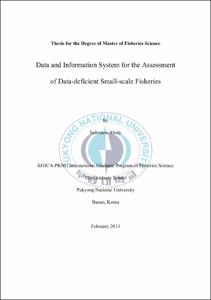Data and Information System for the Assessment of Data-deficient Small-scale Fisheries
- Abstract
- The management of data-deficient small-scale fisheries in tropical developing countries is faced with so many challenges. The lack of funds, qualified personnel coupled with the multispecies nature of these fisheries calls for particular attention when designing any management approach for them. This study briefly reviews methods for assessing fisheries resources, analyses the current fishery data system in Cameroon, and proposes an ecosystem approach to their management.
Top-down centralized fisheries governance coupled with conventional management approaches are not very suitable for the effective management of small-scale multispecies fisheries. This is partly due to difficulties associated with the determination of fishing effort and monitoring the actual catch amounts. An ecosystem approach to these fisheries (EAF) requires a wider range of information with consequent challenges in the collection and management. Based upon the requirements of the participation of subsector stakeholders in the process, strengthening of the monitoring systems, effecting necessary changes in fisheries legislation, governance and institutional framework, some progress can be achieved in the effective management of these fisheries.
- Issued Date
- 2013
- Awarded Date
- 2013. 2
- Type
- Dissertation
- Publisher
- 부경대학교
- Affiliation
- 부경대학교 대학원
- Department
- 대학원 국제수산과학협동과정
- Advisor
- 장창익
- Table Of Contents
- Table of Contents i
List of figures iv
List of tables iv
Abstract vi
1. Introduction 1
2. Data and Methods 6
2.1. Data 6
2.1.1. Study area 6
2.1.2. Target fisheries and species 11
2.1.3. Catch and effort from Cameroon’s trawl fisheries 13
2.1.4. Information for tier 2 ecosystem-based fisheries assessment (EBFA) of Cameroon’s small-scale fisheries 14
2.2. Methods 15
2.2.1. Single species stock assessment 15
2.2.2. EBFA 18
3. Results 26
3.1. Cameroon fisheries 26
3.2. Cameroon’s fishery data system 28
3.3. Elements of a fishery data collection system (FDCS) 29
3.3.1. Objectives of the FDCS 29
3.3.2. General design components of the FDCS 29
3.3.3. Sampling design 30
3.3.4. Sampling activity procedure 31
3.3.5. Processing of the system’s database 31
3.3.6. The expansion algorithms and their reliability 32
3.3.7. Quality assurance (QA) method 32
3.3.8. Presentation of the fishery data system results 32
3.4. Single species stock assessment 33
3.4.1. Application of surplus production model 33
3.4.2. Limitations of surplus production model 35
3.4.3. Proposed data collection and management system for single species stock assessment 36
3.5. EBFA 39
3.5.1. Application of the EBFA tier 2 approach 39
3.5.2. Limitations of EBFA 43
3.5.3. Proposed data collection and management system for EBFA 43
4. Discussion and Conclusions 48
Acknowledgements 57
References 58
Appendices 62
Appendix 1: Reference points and risk scores for EBFA (Zhang et al. 2009) 62
Appendix 2: Nested risk indices (ORI,SRI,FRI,ERI) and management status index (MSI) for EBFA (Zhang et al. 2009) 63
Appendix 3: Indicators and reference points for sustainability used in the tier 1 EBFA approach (Zhang et al. 2010) 64
- Degree
- Master
- Appears in Collections:
- 글로벌수산대학원 > 국제수산과학협동과정
- Files in This Item:
-
-
Download
 Data and Information System for the Assessment of Data-deficient Small-scale Fisheries.pdf
기타 데이터 / 1.87 MB / Adobe PDF
Data and Information System for the Assessment of Data-deficient Small-scale Fisheries.pdf
기타 데이터 / 1.87 MB / Adobe PDF
-
Items in Repository are protected by copyright, with all rights reserved, unless otherwise indicated.